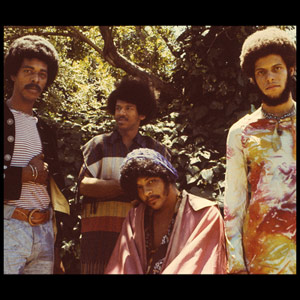
Black Beauty
High Moon
Time changes everything, or so they say. All that really means is that once something fades from our short-term memory our remembrance of it will never be as strong, or more accurately, as clear. In respect to rock history, this adage is probably never more true than in the case of Love. Led by singer and guitarist Arthur Lee, the San Franciscan band melded the psychedelic aesthetics of the time with orchestrated pop, best exemplified by “Alone Again Or,” the leadoff track to Love’s magnum opus, Forever Changes.
Forever Changes was the third album that Lee made with the original line-up of Love, which included guitarist Bryan MacLean, who wrote “Alone Again Or” and wrote or cowrote a couple other songs on the album. That version of Love broke up not long after Forever Changes’ release in 1967. The common belief is that was the end of the band and Love’s stature dwindled to that of a footnote until Forever Changes was reissued in a deluxe edition at the turn of the century to a new generation turned on to psychedelic pop. Lee, who was in prison for illegal possession of a firearm, was seen as an overlooked legend and the call went up to “free Arthur Lee!” Lee was eventually released from prison and assembled a version of Love to tour playing Forever Changes. He died in 2003 from leukemia, now remembered as a musical genius.
Of course, what most neglect to remember is that Lee continued making records under the Love moniker for years after the original group disbanded. In fact, he continued using the Love name until 1975, albeit with different personnel. And unlike the majestic pop for which Love earned its reputation, Lee had shifted his focus toward a hard-rocking brand of boogie that wasn’t nearly as compelling.
So if you forgot that Love’s legacy hasn’t been completely spotless then indeed the unearthing of Black Beauty, an album from 1973 that went unreleased after the band’s label at the time, Buffalo, went under, is indeed a momentous occasion. As it it, though, the long bootlegged record is inline with Lee’s post–Forever Changes work. On “Midnight Sun” and much of the album, Lee’s gruff vocals resemble those of Bob Seger, while the backing is akin to something like a harder edged version of the Band.
Cuts like “Good & Evil” and “Product of the Times” will be familiar to those who picked up Sundazed’s Love Lost from a couple years ago, and in general, there’s nothing here to really bolster the Love catalog. The calypso-flavored “Beep Beep” is lighthearted, but hardly compelling. Similarly, most of the record is completely inconsequential. Were this album made by anyone else, it would be forgotten as middle-of-the-road post-hippie rock. I wouldn’t go so far as to call it a blemish on Love’s legend, but it is probably best left forgotten.
Stephen Slaybaugh
PAST PERFECTS
DOA, Something Better Change and Hardcore 81
Simple Minds, Sparkle in the Rain
Mercury Rev, Deserter's Songs
Blank Dogs, Collected By Itself: 2006-2009
The Kinks, Kinks, Kinda Kinks and The Kink Kontroversy
The Zeros, "Main Street Brat" and The Normals, "Almost Ready"
Pearl Jam, Vs. and Vitalogy
Swearing at Motorists, Postcards from a Drinking Town
Talk Talk, Spirit of Eden
Disco Love 2: More Rare Disco & Soul Uncovered
Nick Lowe, Labour of Lust
Queens of the Stone Age, Queens of the Stone Age
Human Switchboard, Who’s in My Hangar?
Johnny Cash, From Memphis to Hollywood: Bootleg Vol. 2
